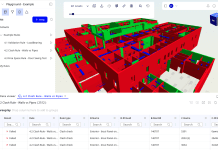BIM means lots of things to many people and risks being one of the most misused words in construction, however BIM represents the enabler to a transformation that is engulfing not only the UK but also the global design, engineering & construction market; and why, because BIM enables us to work together more easily, in a modern digital environment
Using BIM we are encouraged to share information bringing efficiency and visibility, to ultimately, reduce the risk and cost of our projects.
In addition we influence and improve the ongoing operation of our assets, delivering a better more intelligent output for our clients and in doing so providing them with more value in their portfolio of assets.
BIM enables people to interact with their projects in a visual environment, but is increasingly focussing on “the I in BIM”, the INFORMATION, which is held within the modelled objects as data.
With modern BIM tools, information previously held in separate and disconnected documents can be created and held within the modelled objects as the central repository for core project information.
Like the automotive industry before us, the efficiency and simplicity of a managed information process contributed to the renewed success of manufacturing. The effect has been that we buy more cars, appreciate the fact that they are more reliable, last longer and cost less to use and maintain – vehicle manufacturing is in new health.
The expectation is the same for the construction industry, allowing us to define and communicate our requirements better, iron out issues before arrival on site, remove unnecessary waste in the process and provide, for the Client, a better service and an intelligent model that can help better manage the clients asset through its operational lifecycle.
Not surprisingly achieving the utopia from this transformation, like all transformations has it’s challenges, however, much has been done to address the needs of industry through new technology, and the guidance for the new BIM-enabled project delivery process is established in the British Standard and PAS 1192 series, but to maximise the benefits of these new tools we need to consider the working practice changes that are also needed in many environments.
Driven by a focus on low-cost procurement that can result in uncertain end out cost and, subject to your position in the supply chain, insufficient consideration of whole life operational cost, together with margins driven ever lower in a highly competitive market we are often faced with risk aversion rather than more proactive risk management.
However, in some parts of our industry suppliers and manufacturers are fully integrated with 3D CAD-CAM tools either direct to manufacture or through the creation of fully coordinated pre-assembled or pre-manufactured modules that dramatically reduce the onsite work and risks in installation and in doing so provide a higher quality product, manufactured and tested in a controlled environment.
The vision of BIM is that all parties in the supply chain collaborate across the same source of information, and make informed decisions based on better information with an improved awareness of the repercussions on others.
BIM delivers the maximum benefit when all parties take part, the leadership of key Clients like Government, who acknowledge the benefits in project delivery and on-going asset management has been instrumental in establishing BIM as a modern working practice.
The prize for all of us is a better, more efficient, higher quality, world leading industry.
Providing a simple solution to the technology and workflow issues of BIM is where Clearbox can support the process.
Clearbox
Clearbox are a technology provider looking to bring the opportunity of BIM to all through their digital information hub BIMXtra which enables simple access to the information based around a true common data environment. BIMXtra addresses many of the issues of BIM by bridging the gap between the complexity of the BIM authoring tools and the plethora of project tools that characterise the current construction market. BIMXtra not only supports project delivery during the design and construction phase but delivers out the intelligent asset information at handover to provide a new level of opportunity for Facility Management and Asset Management.
BIMXtra takes information from BIM and makes it available to all in the simplest of approaches. Each user has access to the information they need in the right format at the right time, allowing the influence of BIM to be shared out from the design through the entire project delivery phase. BIM in BIMXtra not only enables interrogation and exploitation of the visuals but also extends and enables the full digital information management of the project.
Developed by individuals with years of experience of delivering design and build projects, and who use BIMXtra tools themselves on their own projects, BIMXtra will help enable consultants, contractors, and SMEs alike to enjoy and benefit from BIM.
So if you are starting your journey or have uncovered some of the complexities of BIM then we can support you to meet the requirements of Level 2 BIM and beyond as a hosted solution. As 2016 approaches and the gap between the haves and have not’s of the BIM world grows there is no better time to jump on board and benefit from the lessons learnt from some of the early adopters.
In this, the first of four articles leading to the 2016 deadline we aim to take you on a journey of the simple functionality that is now readily available, as well as reassure individuals of the benefits of BIM that can be realised in case studies.
In the next papers, we will address the solutions and some case studies to allow users to appreciate the scale of the benefits and the simplicity and ease with which this can be achieved starting with the interface to programme.
Graeme Forbes
Managing Director
Clearbox
Tel: +44 (0)800 085 9872








![[Video] Fireco: 80 new fire doors required for residential flats in London](https://www.pbctoday.co.uk/news/wp-content/uploads/2025/04/2024-06-01-Lords-view-one_1200x750_004-218x150.webp)




